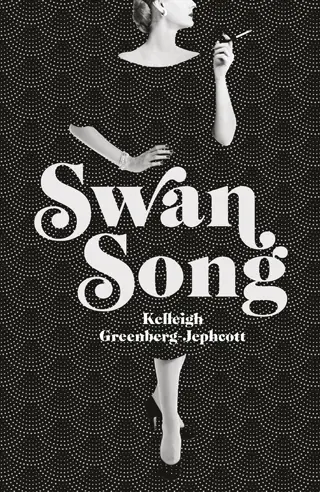Swan Song by Kelleigh Greenberg-Jephcott – Review

By Rachael Popow
As a teenager, I’d fallen under the spell of the movie Breakfast At Tiffany’s (well, apart from the bits with Mickey Rooney as an offensive Japanese stereotype) and decided to read something by Truman Capote, who’d written the novella on which it was based. But rather than starting with his acknowledged masterpiece In Cold Blood, or even Breakfast At Tiffany’s, I somehow began with the short story ‘La Cote Basque, 1965’, a chapter from his unfinished novel Answered Prayers, which was published in Esquire magazine in 1975.
It’s an account of a long, boozy lunch between the writer Jonesy and his friend Lady Ina Coolbirth as they gossip about the clientele at the eponymous restaurant and eavesdrop on their fellow diners. A lot of real names are dropped in the course of the story – including the Duchess of Windsor, Jackie Kennedy, Cole Porter, Walter Matthau and JD Salinger – but Kelleigh Greenberg-Jephcott’s new novel Swan Song reveals that if I’d been a New York socialite of the 1960s, rather than a sixth former in 1990s East Yorkshire, I would have also recognised the characters who appeared under aliases.
“Fascinating figures”
 Capote had been taken into the confidence of some of New York’s richest and most elegant women, whom he dubbed his swans, and in ‘La Cote Basque,1965’, he spilled their secrets. In the biggest betrayals, Slim Keith, who Capote affectionately referred to as ‘Big Mama’, became the well-married, loose-lipped Lady Ina, while his best friend Babe Paley’s husband Bill was transformed into Sidney Dillon, the focus of a humiliating anecdote about his efforts to hide the evidence of a messy one-night stand from his wife. They all recognised themselves (and each other), and Capote, to his apparent surprise, found himself largely shut out of high society, sending him into a downward spiral.
Capote had been taken into the confidence of some of New York’s richest and most elegant women, whom he dubbed his swans, and in ‘La Cote Basque,1965’, he spilled their secrets. In the biggest betrayals, Slim Keith, who Capote affectionately referred to as ‘Big Mama’, became the well-married, loose-lipped Lady Ina, while his best friend Babe Paley’s husband Bill was transformed into Sidney Dillon, the focus of a humiliating anecdote about his efforts to hide the evidence of a messy one-night stand from his wife. They all recognised themselves (and each other), and Capote, to his apparent surprise, found himself largely shut out of high society, sending him into a downward spiral.
Swan Song moves backwards and forwards in time to explore Capote’s reasons for writing the story, the fall out from the publication and the lives of some of the women who had unwittingly served as his muses.
One of the questions that haunts the novel is whether Answered Prayers would have been a grand artistic achievement that justified the hurt it caused or little more than glorified gossip. It’s a criticism that could also have applied to Swan Song, but Greenberg-Jephcott makes a strong case for the ‘swans’ as fascinating figures in their own right, and makes the reader see why their stories might be worth telling. In this version of events, one of the swans, Gloria Guinness, is vaguely hurt that she didn’t make a cameo in ‘La Cote Basque, 1965’, as she felt her life was more interesting than the people who did make the cut, and based on this novel, she had a point.
“Raises some universal questions”
In fact, Swan Song is probably stronger when focusing on the women than when trying to explore Capote’s complex motivations, although Greenberg-Jephcott does draw some interesting parallels between the controversy and the writer’s childhood.
When reading the novel, it certainly helps to be vaguely familiar with Capote’s life and work (fans of the biopics Capote and Infamous, which both focused on the earlier In Cold Blood, will be aware that Answered Prayers wasn’t the first time the writer found himself crossing lines when it came to writing about real people). And, as with the sections of Answered Prayers that saw the light of day, readers of Swan Song may wonder how much is real and how much has been fictionalised.
But Greenberg-Jephcott raises some universal questions about what writers owe to the people in their lives and the way stories change in the telling, while also offering a fascinating snapshot of New York high society in the 1960s and 1970s. Maybe my decision to start with ‘La Cote Basque, 1965’ wasn’t such a bad one after all…
‘Swan Song’ by Kelleigh Greenberg-Jephcott is published by Hutchinson, £12.99 hardback









